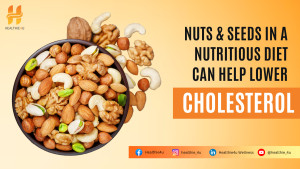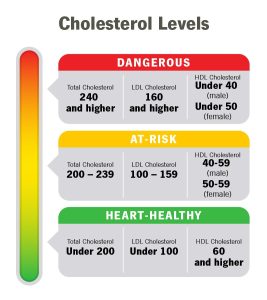

Cholesterol is a type of fat that is present in every cell of our body. It serves a crucial function in the
body such as formation of cell membranes, production of several hormones, and the synthesis of
Vitamin D. These functions are vital for maintaining overall health and supporting various bodily
processes.
Liver makes most of the cholesterol that our body needs and the rest of it is sourced from
animal-based foods such as beef, pork, lamb, processed meat like sausages, whole milk, cream, butter,
fried foods, cakes, biscuits, etc.
There are 2 types of cholesterol:
● HDL Cholesterol:
HDL cholesterol is often called “good” cholesterol because it helps transport excess cholesterol from the bloodstream back to the liver, where it is broken down and eliminated from the body.
● LDL Cholesterol:
LDL cholesterol is often referred to as “bad” cholesterol because it can lead to the accumulation of fatty deposits in the arteries, known as atherosclerosis. This buildup narrows the arteries, raising the risk of heart attacks, strokes, and peripheral artery disease.
High cholesterol is mainly influenced by dietary habits, such as eating foods high in saturated and trans fats. A sedentary lifestyle, being overweight, smoking, and drinking alcohol can also contribute significantly. Furthermore, genetic factors can predispose some individuals to high cholesterol levels, making it a hereditary issue for some families.
High cholesterol typically does not present any symptoms, which is why it’s often referred to as a “silent” condition. Many people are unaware of their cholesterol levels until they undergo a blood test.
Normal level of Cholesterol are as follows:

Nuts and seeds are packed with beneficial nutrients that play a significant role in cholesterol management. Let’s explore how nuts and seeds can support your heart health and contribute to a balanced diet.
● Healthy Fats:
Nuts and seeds are good sources of monounsaturated fatty acids (MUFAs) and polyunsaturated fatty acids (PUFAs). These healthy fats are effective at lowering LDL cholesterol, while simultaneously boosting HDL cholesterol.
● Phytosterols:
Found in plant-based foods like nuts and seeds, phytosterols are compounds that play a crucial role in reducing cholesterol absorption in the intestines. By blocking this absorption, they help lower overall cholesterol levels, promoting better heart health.
● Dietary Fibre:
Many nuts and seeds are excellent sources of dietary fibre. This fibre helps lower cholesterol absorption in the bloodstream and contributes to a healthy digestive system, both of which are vital for overall health.
● Polyphenols:
Nuts and seeds are abundant in antioxidants called polyphenols, which can enhance heart health by minimizing inflammation and oxidative stress, both of which are linked to cardiovascular diseases.
Here are some tips for incorporating nuts and seeds into your diet:
● Snack Smart: Keep a mix of nuts or seeds on hand for a nutritious snack throughout the day.
● Boost Breakfast: Add nuts or seeds to the oatmeal, yoghurt, or smoothie bowls for added texture and nutrients.
● Elevate Salads: Sprinkle nuts or seeds on salads for a satisfying crunch and healthy fats.
● Nut Butters: Spread almond, peanut, or sunflower seed butter on toast or use it as a dip for fruits and veggies.
● Cereal Upgrade: Enhance the breakfast cereal or granola with nuts and seeds for an added nutrient boost.
● Energy Bites: Make energy bites by blending nuts, seeds, oats, and natural sweeteners for a quick snack.
● Homemade Trail Mix: Create a trail mix with a combination of nuts, seeds, dried fruits, and dark chocolate for a satisfying on-the-go treat.
● Smoothie Boost: Blend nuts or seeds into smoothies for enhanced creaminess and nutritional value.
In conclusion, including nuts and seeds in your diet is an excellent way to enhance heart health and effectively manage cholesterol levels. These nutrient-dense foods provide healthy fats, phytosterols, dietary fibre, and antioxidants, all of which work together to support cardiovascular wellness. By making small adjustments, such as snacking on nuts, adding seeds to smoothies, or enhancing salads, one can easily boost the intake of these beneficial foods.
Ultimately, adopting a balanced diet that includes nuts and seeds, along with maintaining a healthy lifestyle, can lead to improved cholesterol levels and overall health.


